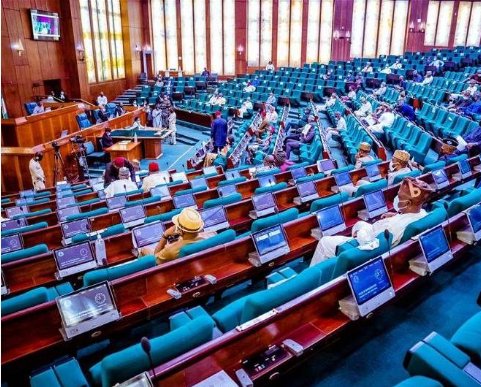
The House of Representatives, on Thursday, passed the Student Loans Re-enactment Bill for second reading.
The executive bill titled “A Bill for an Act to repeal the Students Loans (Access to Higher Education) Act, 2023 and Enact the Student Loans (Access to Higher Education) Bill, 2004 to Establish the Nigerian Education Loan Fund as a body corporate to receive, manage and invest funds to provide loans to Nigerians for higher education, vocational training and skills acquisition and for related matters,” was read on the floor of the House by the Leader, Julius Ihonvbere.
Before asking Ihonvbere to lead the debate on the general principles of the bill, Speaker of the House, Abbas Tajudeen, read President Tinubu’s letter titled, “Transmission of Student Loans (Access to Higher Education, Repeal and Enactment) Bill, 2024,” seeking the nod of the lawmakers to act on the proposed legislation.
The letter obtained by our correspondent read, “Pursuant to Section 58(2) of the Constitution of The Federal Republic of Nigeria, 1999 (as amended). I forward, herewith, the Student Loans (Access to Higher Education) (Repeal and Re-Enactment) Bill, 2024 for the kind consideration of the House of Representatives.
“The Student Loan (Access to Higher Education) (Repeal and Re- Enactment) Bill, 2024 seeks to enhance the implementation of the Higher Education Student Loan Scheme by addressing challenges related to the management structure of the Nigerian Education Loan Fund, applicant eligibility requirements, loan purpose, funding sources and disbursement and repayment procedures.
Leading the debate, Ihonvebere who represents Owan East/Owan West Federal Constituency, Edo State, argued that many young Nigerians desirous of pursuing higher education have not been able to realise their dreams owing to the difficult economic situation in the country.
He argued that the need for a repeal of the 2023 Act is informed by the lack of clarity in the operational procedures, mode of repayment of the loan as well as sustainability of the scheme, adding that the 2024 Re-Enactment Bill has addressed the lapses.
“Education is a valid instrument in the fight against poverty and thankfully, we now have a President who is committed to making education affordable to all Nigerians. I urge my colleagues to give this bill an accelerated hearing,” he said.
Recall that the Student Loan (Access to Higher Education) Act 2023 was signed into
law by President Tinubu GCFR June 12, 2023. The Act established the Nigerian Education Loan Fund to supervise, coordinate, administer and monitor the management of student loans in Nigeria.
The administration of the fund was vested in a Special Committee, with the Governor of the Central Bank of Nigeria as the Chairman.
Although the Federal Government allocated over N200bn to the Fund through appropriations and
presidential directives, implementation of the scheme has been hampered by problems with some provisions of the Act.
According to the House Leader, the 2023 Act imposed on the CBN Governor management and
executive responsibilities outside the core mandate of the apex bank.
Ihonvbere added “Under the 2023 Act, students can only apply for loans to
pay tuition fees. Federal tertiary institutions don’t charge tuition fees. However, students must pay other institutional charges.
He continued, “Under the current (2023) Act, students would not be able to apply to the Fund for loans to cover those other institutional charges or their other upkeep costs, thus defeating the purpose of the loan, which is to ease access to tertiary education for young Nigerians. On the eligibility criteria for applicants, Ihonvbere said the 2023 Act allows only applicants with a combined family income of less than N500,000 per annum to apply, stressing that “Under this provision, the child of a person who earns N45,000 a month is disqualified from applying for this loan.”
The 2023 Act required that applicants provide two guarantors “Who shall be a civil servant of level 12 and above, a lawyer with ten years post-call experience, a judicial officer, or a justice of the peace; a provision described by Ihonvbere as “A high bar that would have disqualified many more of the people who need these loans from applying.”
The Act also disqualified the children of parents who have defaulted on any loans previously from applying for the student loans.
The Act also criminalises failure to repay loans obtained from the Fund without consideration for circumstances, including unemployment, death, or disability, that may affect an individual’s
ability to pay.
Under the proposed bill, NELFUND is established as a body corporate that can sue and be sued in its name and has the power to acquire, hold, and dispose of movable and immovable property
for the purpose of its functions.





